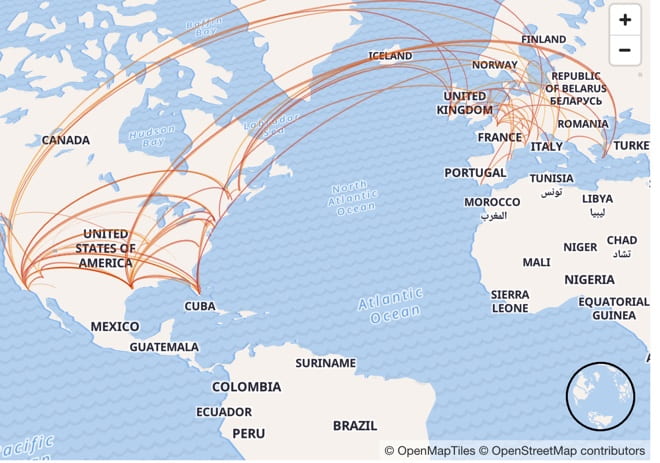Travis Scott emerges as the top emitter of carbon dioxide from private jet travel in 2023, raising concerns about the environmental impact of frequent flying. The article explores the carbon footprint of private aviation compared to commercial flights, highlighting the disparities and implications for climate change.
Efforts to mitigate the environmental impact, such as carbon offsets, are discussed, but concerns about their effectiveness and regulation are raised. Calls for greater taxation and regulation of private aviation are echoed by climate and inequality activists, emphasizing the need for more equitable policies to address the disproportionate environmental impact of private jet travel by the wealthy elite.
Top 10 Worse Jet Emissions 2023
- Travis Scott
- Kim Kardashian
- Elon Musk
- Beyonce & Jay-Z
- Bill Gates
- Steven Spielberg
- Tyler Perry
- Leonard Blavatnik
- Kylie Jenner
- Celine Dion
The text emphasizes the constraints of monitoring emissions from private jets used by celebrities, pointing out that the data may not be entirely reliable because it depends on information that is made publicly available. Significant emissions are still visible in spite of this.
With an anticipated 13,362,879 pounds of carbon dioxide emissions from private jet travel in 2023, rapper Travis Scott is the leading emitter.
Scott’s environmental impact is highlighted by drawing a comparison between his carbon footprint and the average worldwide emissions per person. The Institute for Policy Studies also mentions a paper that looked at the emissions from several modes of transportation during a brief travel between airports in Virginia and New York.
Taylor Swift claims she can offset the immense carbon footprint of her private jet but the only way for high-flying celebrities and the superrich to reduce their climate impact is to fly less and choose more sustainable forms of transport.
Although Taylor Swift is not on the top ten list in the year 2023, many articles are still written about her regarding emissions, because she began to purchase carbon offsets to balance her carbon footprint, which is also criticized as a sustainable practice.
The article explores the issue surrounding Taylor Swift’s emissions from her private jet, illuminating the wider ramifications of celebrities and the wealthy elite using private jets. It highlights the shortcomings and uncertainties of offsetting systems and condemns the practice of utilizing carbon credits to mitigate the environmental effect of private jet travel.
The article draws attention to the absence of regulations in the airline industry and highlights the disproportionate carbon emissions of private planes in comparison to other forms of transportation. It highlights the necessity of stricter regulations and levies on the use of private aircraft in order to reduce aviation emissions.
The study also casts doubt on the idea that offsetting may release celebrities like Taylor Swift from their need to lessen their carbon footprint. It makes the case that substantial emissions reductions, as opposed to depending on offsetting mechanisms, are necessary for effective climate action.
In the end, the essay emphasizes the importance of taking climate action to protect the planet’s future and asks for increased accountability and action to address the environmental impact of high-polluting activities like private jet travel.
HIGH FLYERS 2023 How Ultra-Rich Private Jet Travel Costs the Rest of Us and Burns Up Our Planet
- Approximately 1% of the population is accountable for half of all aviation carbon emissions, with private jets emitting at least ten times more pollutants per passenger than commercial aircraft.
- About one in six flights that the FAA handles are private jet flights, yet they only make up 2% of the revenues that finance the agency, which mostly comes from fuel surcharge fees.
- Full and fractional owners of private jets have median net worths of $190 million and $140 million, respectively. These owners make up a tiny portion of the world’s population and are primarily involved in real estate, banking, and finance.
- With a 133% increase in the global fleet over the last 20 years and a record number of business jet operations in 2022, the private jet industry has seen tremendous expansion.
- The imposition of a transfer fee on private aircraft has the potential to yield significant revenue, since estimates suggest that it may reach billions of dollars yearly.
- Should suggested transfer fees and jet fuel taxes be put into effect, one of the most frequented high fliers in the United States, Elon Musk, will have to pay millions more in taxes.
- Publicly supported municipal airports in the US frequently cater mostly to private and business aircraft, prompting concerns about the use of government subsidies.
- The National Business Aviation Association, which leads the private jet lobby, has invested large sums of money in advocating for tax breaks and relief, even during the Covid-19 pandemic
- The genuine ownership of private aircraft can be hidden by ownership arrangements like private trusts, which could pose security issues.
- Although sustainable aviation fuels (SAFs) offer the potential to lower emissions, there remain obstacles to overcome, including cost and restricted availability.
